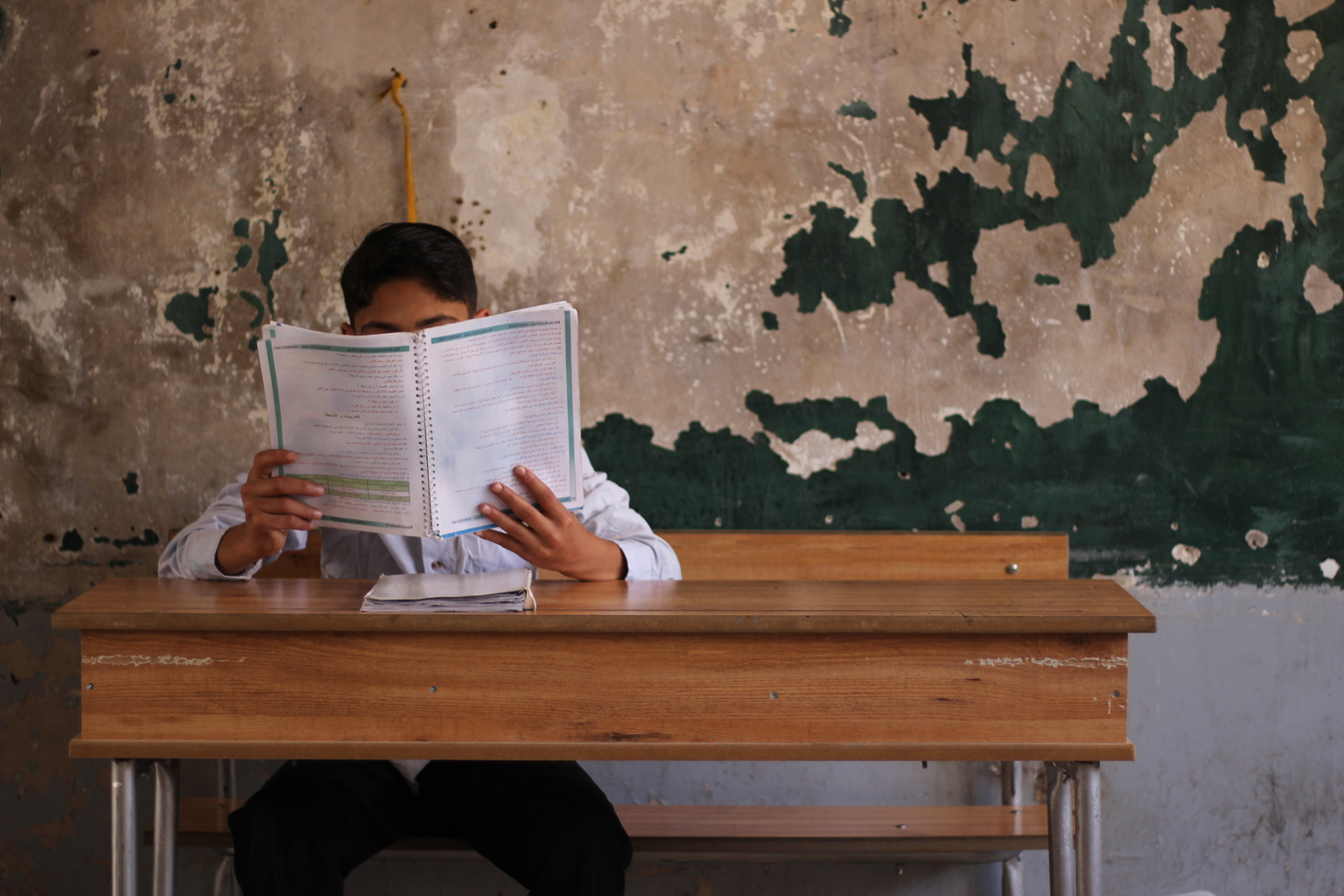Seven
2018-04-19
© UNICEF/Syria/2017/Al-Issa
A 15 year old boy who missed a year of schooling when violence escalated in his village in Syria.
Civil war Sieges Bombings Casualties Refugees
I had heard these terms in history class, abstract concepts I hadn’t paid much attention to. Seven years ago, at the age of eleven, they became my reality.
2011
I was sitting in English class when the school’s supervisor suddenly interrupted the session. He told me I wouldn’t be going home today, but to my uncle’s house, where it was safer. I didn’t quite understand why, but it didn’t bother me too much. An hour later the supervisor returned, informing me that a bomb just exploded near my uncle’s house – I would go home after all.
I remember the bus ride home that day – empty streets, scared faces peeking out of windows, gunshots, shouting from afar.
As we were approaching my house the bus driver yelled, “Get ready, kid!” He accelerated, then suddenly hit the akes and opened the door. I heard my parents screaming, “Run, run, run!” Suddenly I was running towards my house, rifle fire surrounding me.
Arriving at home, I couldn’t grasp the gravity of the day’s events. It was only that evening, when I was informed that schools were closed until further notice, that it hit me. We were at war.
What followed were long days with almost no electricity, food, or phone reception. I was worried about my older siblings who lived in other parts of the country.
As soon as we could leave the city, we headed to the countryside, hoping that it would be safer there. Arriving at our new home, we were finally able to reunite with my other and sister.
2012
Fortunately, schools were open again. But we still couldn’t go back home. To resume my education, I attended a school in the countryside. For a whole semester, my father had to drive me to school, passing army checkpoints and dodging gunfire.
Towards the end of the semester the situation worsened. Due to the violence, we had to flee to Damascus where we stayed with relatives.
When I found a public school nearby, the second semester had already started. The books we used were different. It was challenging — studying for the finals, living in a new environment, catching up on what I had missed.
But I decided to give my best. I studied hard, day and night. I passed.

© UNICEF/Syria/2017/Abdulaziz
A primary school in rural Damascus, Syria is damaged due to continuous violence in the area.
2013
The shelling in Damascus intensified every day – it got worse and worse. Eventually, we decided to go back home.
For the first time in a long time, the situation appeared more stable back in my city. We were still cautious, but we had gotten used to the bad situation. We tried to move on with our lives. I joined a new school and continued my education.
2014
Bombs would go off in our neighborhood – dead bodies and injured people were scattered around. The Red Crescent would come and pick them up. We saw it so many times, it almost became a routine. We lost people dear to us that year.
The bombings became more vicious. After a bomb would hit, people would hurry to the site to help the wounded and the second bomb would soon follow. The death toll was rising by the day.
At that point, my sister decided to move to another city and my other left the country, hoping to find a job and a better life.
2015
My family was now scattered across the world. Only very few people stayed in Syria. The ones who remained tried to stay sane.
For a moment, we were optimistic that an end is in sight. Then the kidnappings and rapes started – they were the offspring of the war.
On a sunny day in October at noon, my best friend was abducted in his own neighborhood, driving around in his car. We knew that they did it for money. His family paid the ransom and his mother pledged not to leave the house until her son returned home. He never came back.

© UNICEF/Syria/2018/Khabieh
A Red Crescent vehicle drives past destroyed buildings in Douma, Eastern Ghouta, Syria.
2016
We started to live each day as if it would be our last. It was the only way to move forward.
We knew that we could die any second. Death was lingering in front of your eyes.
2017
Life became a bit more bearable. Alienated relatives would come to visit. Before, we used to talk about which restaurant to go to or which places to visit. Now we would talk about relatives who had drowned trying to seek refuge in another country.
Even if times were incredibly hard, every now and then we managed to laugh. Our wounded souls had stopped bleeding – massive scars appeared instead.
2018
Today. Now.
I am writing this text recapping the past seven years of agony, torture, torment, discomfort, grief, and misery.
I haven’t seen my other in four years, my sister in two. My best friend remains missing – I don’t have any news of him.
The endless war has made me fall behind in my education. I know I will have to go the extra mile and give everything in order to succeed.
The tragedies of the past seven years have taught me something about myself. Even in the grimmest situations, losing people I love, I have found new strength to move on.
I can’t surrender to the circumstances around me. I have to keep following my dreams. I am not simply a survivor. I am the creator of my own destiny.
Rawd Dandashi is 19 years old and lives in Syria.










